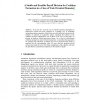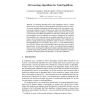134 search results - page 13 / 27 » On the Complexity of Computing Values of Restricted Games |
SIGMETRICS
2010
ACM
14 years 17 days ago
2010
ACM
A new generation of content delivery networks for live streaming, video on demand, and software updates takes advantage of a peer-to-peer architecture to reduce their operating co...
ATAL
2001
Springer
14 years 7 days ago
2001
Springer
In the last few years the use of coalition formation algorithms in multi-agent systems has been proposed as a possible way of modelling autonomous agent cooperation. Game theory pr...
SAGT
2010
Springer
13 years 6 months ago
2010
Springer
Can learning algorithms find a Nash equilibrium? This is a natural question for several reasons. Learning algorithms resemble the behavior of players in many naturally arising gam...
SIGECOM
2005
ACM
14 years 1 months ago
2005
ACM
We present a new approach to representing coalitional games based on rules that describe the marginal contributions of the agents. This representation scheme captures characterist...
ATAL
2010
Springer
13 years 8 months ago
2010
Springer
We consider the computational complexity of pure Nash equilibria in graphical games. It is known that the problem is NP-complete in general, but tractable (i.e., in P) for special...


